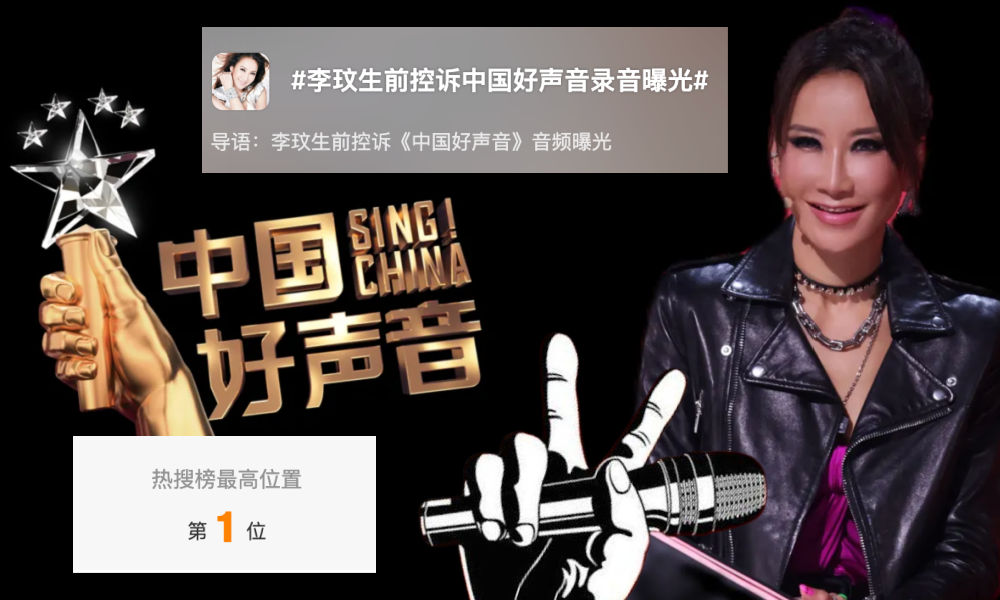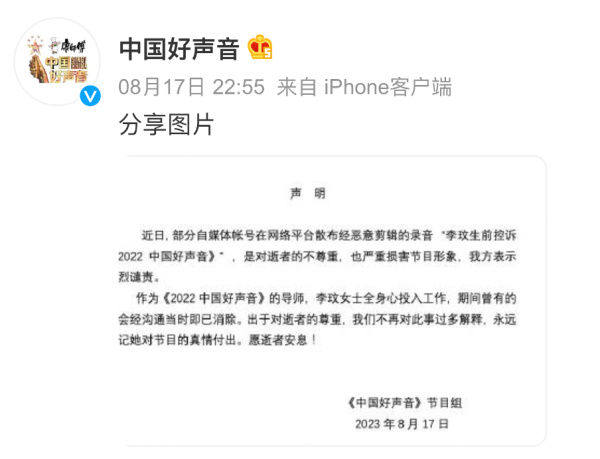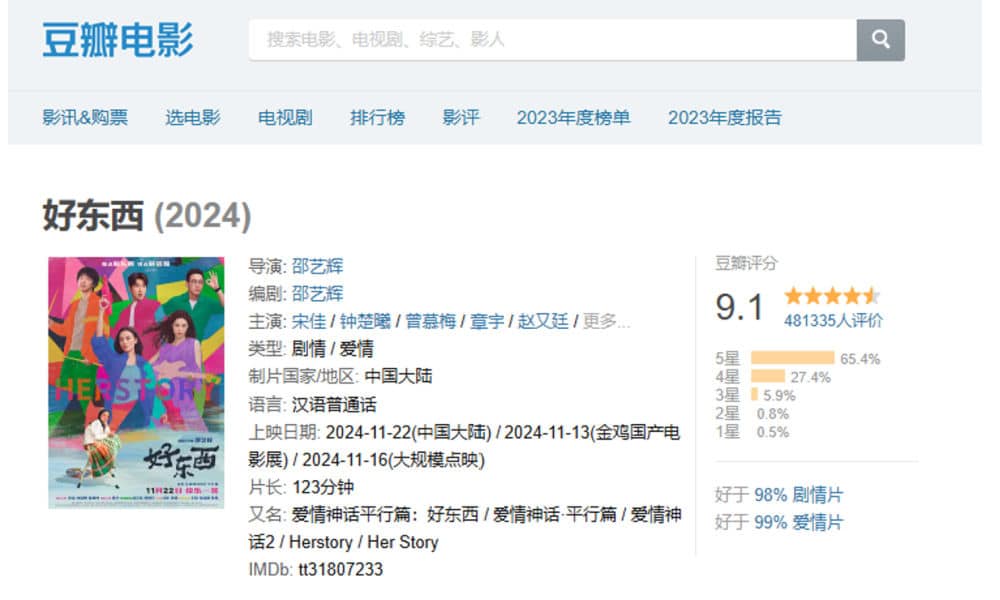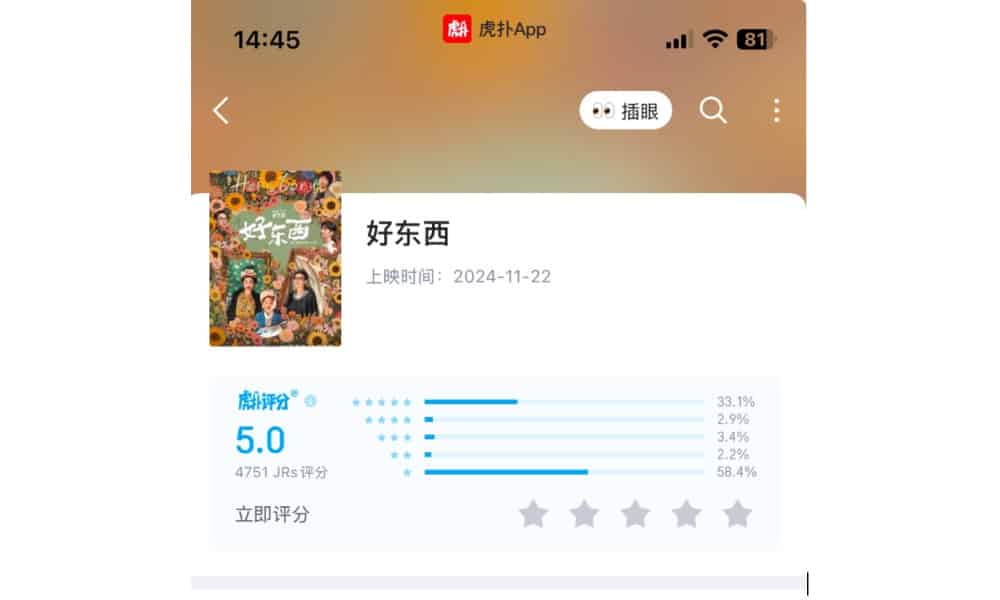China Arts & Entertainment
Leaked Audio Clip of Deceased Pop Star Coco Lee Denouncing ‘Sing! China’ Sparks Anger on Chinese Social Media
The leaked Coco Lee recording has been dominating online discussions, with one related hashtag receiving over 2,6 billion (!) views on Weibo.
Published
1 year agoon

A leaked audio recording of the late superstar Coco Lee discussing her negative experiences with Chinese talent show Sing! China (中国好声音/The Voice of China) has become the no 1 searched topic on Weibo these days. The accusations against the popular show have shaken up China’s entertainment circles and the online condemnation of ethical standards in the industry also has offline consequences.
Coco Lee (李玟), an iconic Hong Kong-born pop star who had been active in the music industry for nearly three decades, tragically ended her own life on July 5th of this year. Her passing unveiled her previously hidden struggle with depression, exposing a more vulnerable side to her glamorous and impeccable image. Later, public discussions about Coco Lee focused on her marriage and family situation.
That is until this week, when a troubling audio clip featuring Coco Lee was exposed in which the singer accused the production team of talent show Sing! China (a revamped editon of The Voice of China), alleging mistreatment. This revelation has sparked public discontent and reshaped public perceptions of both the singer and the show.
The 9-minute-long audio recording surfaced on Weibo on August 17, originating from undisclosed sources. It presented a candid and emotionally charged narrative of Coco Lee’s experiences as a mentor/judge on the talent show.
Sing! China (中国好声音) is a music competition show broadcasted by Zhejiang TV (浙江卫视) and produced by Star (CM) Holdings Ltd. It is the Chinese version of the international reality television singing competition franchise The Voice, based on the reality singing show The Voice of Holland.
Not long after Coco Lee’s passing, fans raised concerns about the alleged unpleasant experiences Coco had with Sing! China and its production team back in 2022, during the recording of the seventh season. This included a fall that resulted in a leg injury, which further exacerbated Coco Lee’s already declining mental and physical health condition.
The leaked recording of Coco Lee’s experiences on the show primarily covers several points:
◼︎ First, while she was secretly battling breast cancer, Coco Lee chose to participate in The Voice of China to support young music enthusiasts. She joined without even knowing what the exact compensation would be.
◼︎ Coco Lee disagreed with the show’s competition format, which eliminated contestants without assigning scores. She advocated for fairness but faced resistance from the program. The production team allegedly even physically confronted her, grabbing her clothes, and a director’s assistant threatened her to leave immediately.
◼︎ Coco spoke out for contestant Fige (菲戈), who she thought faced unfair treatment. A video of her defending Fige circulated online, pressuring the production team to address the issue. They eventually gave Fige another chance in the show but demanded that Coco Lee would clarify on Weibo that there were no problems with the production team, attributing the issue to misunderstandings.
◼︎ On the final recording day of Sing! China on October 14th, despite Coco Lee’s declining health—complaining of numbness and loss of warmth in her left leg—she chose not to use a wheelchair or crutches. She wanted to maintain her appearance by wearing high heels. However, the production team denied her request to have guest artist Wang Zepeng stand by her side.
◼︎ Last, following the show’s airing, Coco Lee expressed deep disappointment. She felt as if her efforts and dedication were invisible, and her body had suffered for the sake of the show.
By now, the related Weibo hashtag “Leaked Recording of Coco Lee Denouncing ‘Voice of China’ Before her Death” (#李玟生前控诉中国好声音录音曝光#) has received a staggering 2,6 billion views.
After the recording was exposed, the production team behind Sing! China issued a late-night statement on August 17. The statement said:
“Recently, some self-media accounts have spread maliciously edited audio clips regarding Coco Lee denouncing ‘The Voice of China’ before her death, in 2022. This is disresprectful to the deceased and also seriously damages the show’s image. We strongly condemn it. As a coach on ‘Sing! China’ 2022, Ms. Coco Lee fully devoted herself to her work. Any misunderstandings that might have come up during the period have already been dealt with. Out of respect for the deceased, we won’t go into this matter too much and we will always remember her true dedication to the show. Let the deceased rest in peace!”

Statement by “Sing! China”
Although the talent show accused netizens of editing the audio recordings, Coco Lee’s own sister confirmed the authenticity of the recording. A related hashtag garned over 400 million views (#李玟姐姐称网传视频属实#).
Sending Ripples Through China’s Entertainment Sphere
By now, the Coco Lee audio clip has completely shaken up China’s entertainment circles and has been dominating social media platforms. Many Coco Lee fans, as well as regular netizens, have united in outrage over her alleged mistreatment.
Other Chinese celebrities have also voiced their support for Coco Lee. The hashtag “Celebrities Speaking Out for Coco Lee” (#为李玟发声的明星#) has garnered over 170 million views on Weibo by now. Respected Chinese stars such as Jin Xing (金星), Hang Hong (韩红), Yang Pei-an (杨培安) say they believe Coco Lee and hope for justice.
Following the viral spread of the clip, ‘Jammy’ Li Jiajie, a previous contestant on Sing! China, also expressed his solidarity with Coco Lee on Weibo and further condemned the show. He accused the program of engaging in practices such as position buying, enforcing extensive binding contracts, and showing disregard for rules and disrespect towards contestants.
The next morning, however, Li’s posts were removed and he suddenly issued a statement expressing that the comments he made were not actually “based on facts,” making apologies and asking netizens to refrain from spreading misinformation (#李嘉捷向好声音致歉#). If anything, Li’s words and their sudden disappearance caused more confusion and added fuel to the fire.
“This only further strenghthens my believe that Sing! China is rotten to the core,” a popular comment said.
Online Crusade Against Zhejiang TV
As public indignation grew, people started shifting the blame from the Sing! China show to the broadcaster behind the program, Zhejiang Television (浙江卫视), as well as producer Star Holdings (星空华文传媒).
Some netizens even coined the term “Murderer TV” (杀人卫视) to refer to Zhejiang TV, pointing out other disturbing incidents associated with this network’s reality shows.
As early as 2013, Zhejiang TV was condemned by netizens for “disregarding human life” after a young team assistant drowned during a training session for the show Celebrity Splash China.
One of the most notable cases mentioned is the tragic death of 35-year-old actor Godfrey Gao (高以翔) during the filming of the sports reality show Chase Me (追我吧) by Zhejiang TV in 2019. The Taiwanese-Canadian model and actor reportedly suffered a heart attack while on set. Afterward, the show faced criticism for pushing contestants to physical exhaustion and reportedly failing to implement proper safety measures – both factors allegedly contributing to Gao’s unexpected death.
The massive online critique on the TV station also has some potential offline consequences. On social media platforms such as Douban, netizens have compiled lists of sponsors for the upcoming 2023 Sing! China season, urging others to join them in boycotting them.
According to Bloomberg, producer Star Holdings witnessed a significant decline in its stock by 23%, marking the largest drop since the company’s listing in December. This decrease resulted in the eradication of approximately $1.5 billion in market value from the stock, which had surged to more than quadruple its initial value at its highest point.
Rather than solely targeting Zhejiang TV, some netizens have implicated the broader Chinese entertainment industry for putting too much pressure on the people working on their programs. They argue that the industry’s prioritization of viewership and profitability has seemingly contributed to the blurring of ethical boundaries across the sector, and netizens have collectively been calling for more transparency and fairness in China’s entertainment industry.
For now, people are demanding that Sing! China should stop airing until they have corrected their mistakes; Zhejiang TV should critically do a self-inspection and publicly disclose the results. Lastly, audiences are waiting for a public apology to Coco Lee from Sing! China, and an acknowledgement that those involved should be penalized.
Many believe that the truth will eventually always come to light. The fact that Coco Lee, from beyond her grave, managed to cause such a storm in the Chinese entertainment realm is yet another testament to her influence in China’s pop culture and her pursuit of justice within a profit-oriented industry. Weeks after her death, it is her voice that has managed to make a huge impact in China, and there is a hopeful sentiment that the current shock following the recording will bring about positive changes in the future.
By Ruixin Zhang and Manya Koetse
Part of featured image via Nextapple.com
Get the story behind the hashtag. Subscribe to What’s on Weibo here to receive our newsletter and get access to our latest articles:
Spotted a mistake or want to add something? Please let us know in comments below or email us. First-time commenters, please be patient – we will have to manually approve your comment before it appears.
©2023 Whatsonweibo. All rights reserved. Do not reproduce our content without permission – you can contact us at info@whatsonweibo.com.
Stories that are authored by the What's on Weibo Team are the stories that multiple authors contributed to. Please check the names at the end of the articles to see who the authors are.

China ACG Culture
“Black Myth: Wukong”: From Gaming Screens to the CMG Spring Festival Gala?
Published
6 days agoon
January 21, 2025
FROM THE WEIBO WATCH PREMIUM NEWSLETTER
Is Chinese game sensation ‘Black Myth Wukong’ making a jump from gaming screens to the CMG Spring Festival Gala? There’s already some online excitement over a potential performance at the biggest liveshow of the year.
The countdown to the most-watched show of the year has begun. On January 29, the Year of the Snake will be celebrated across China, and as always, the CMG Spring Festival Gala, broadcast on CCTV1, will air on the night leading up to midnight on January 28.
Rehearsals for the show began last week, sparking rumors and discussions about the must-watch performances this year. Soon, the hashtag “Black Myth: Wukong – From New Year’s Gala to Spring Festival Gala” (#黑神话悟空从跨晚到春晚#) became a topic of discussion on Weibo, following rumors that the Gala will feature a performance based on the hugely popular game Black Myth: Wukong.
Three weeks ago, a 16-minute-long Black Myth: Wukong performance already was a major highlight of Bilibili’s 2024 New Year’s Gala (B站跨年晚会). The show featured stunning visuals from the game, anime-inspired elements, special effects, spectacular stage design, and live song-and-dance performances. It was such a hit that many viewers said it brought them to tears. You can watch that show on YouTube here.
While it’s unlikely that the entire 16-minute performance will be included in the Spring Festival Gala (it’s a long 4-hour show but maintains a very fast pace), it seems highly possible that a highlight segment of the performance could make its way to the show.
Recently, Black Myth: Wukong was crowned 2024’s Game of the Year at the Steam Awards. The game is nothing short of a sensation. Officially released on August 20, 2024, it topped the international gaming platform Steam’s “Most Played” list within hours of its launch. Developed by Game Science, a studio founded by former Tencent employees, Black Myth: Wukong draws inspiration from the classic Chinese novel Journey to the West. This legendary tale of heroes and demons follows the supernatural monkey Sun Wukong as he accompanies the Tang Dynasty monk Xuanzang on a pilgrimage to India to retrieve Buddhist scriptures. The game, however, focuses on Sun Wukong’s story after this iconic journey.
The success of Black Myth: Wukong cannot be overstated—I’ve also not seen a Chinese video game be this hugely popular on social media over the past decade. Beyond being a blockbuster game it is now widely regarded as an impactful Chinese pop cultural export that showcases Chinese culture, history, and traditions. Its massive success has made anything associated with it go viral—for example, a merchandise collaboration with Luckin Coffee sold out instantly.
If Black Myth: Wukong does indeed become part of the Spring Festival Gala, it will likely be one of the most talked-about and celebrated segments of the show. If it does not come on, which we would be a shame, we can still see a Black Myth performance at the pre-recorded Fujian Spring Festival Gala, which will air on January 29.

Lastly, if you’re not into video games and not that interested in watching the show, I still highly recommend that you check out the game’s music. You can find it on Spotify (link to album). It will also give you a sense of the unique beauty of Black Myth: Wukong that you might appreciate—I certainly do.
By Manya Koetse
(follow on X, LinkedIn, or Instagram)
Spotted a mistake or want to add something? Please let us know in comments below or email us. First-time commenters, please be patient – we will have to manually approve your comment before it appears.
©2025 Whatsonweibo. All rights reserved. Do not reproduce our content without permission – you can contact us at info@whatsonweibo.com.
Chinese Movies
Why Chinese Hit Movie “Her Story” is ‘Good Stuff’: Stirring Controversy and Celebrating Female Perspectives
China’s end-of-year movie hit, Her Story, is sparking debates and highlighting the rising influence of Chinese female directors.
Published
2 months agoon
December 7, 2024
The Chinese comedy-drama Her Story (好东西, literally “Good Stuff”), directed by Shao Yihui (邵艺辉), has been gaining attention and sparking discussions on Weibo since its late November release in mainland China.
The film features an all-star cast including Song Jia (宋佳), Zhong Chuxi (钟楚曦), Zeng Mumei (曾慕梅), Zhao Youting (赵又廷), and Zhang Yu (章宇). It tells a quirky yet heartfelt story about two women: Wang Tiemei (王铁梅), a self-reliant single mom juggling life and work, and Xiao Ye (小叶), a free-spirited young woman navigating her chaotic relationships.
Their friendship begins when Xiao Ye starts babysitting Tiemei’s nine-year-old daughter, Wang Moli (王茉莉). Xiao Ye introduces her drummer friend, Xiao Ma (小马), to teach Moli how to play the drums, but Xiao Ma’s presence stirs jealousy in Tiemei’s unemployed ex-husband, who schemes to regain his place in the family. Blending humor with poignant insights, the film explores themes of imperfect love, friendship, and the messy process of rebuilding lives.

(“Her Story” poster and the director Shao Yihui)
The film also addresses a range of hot societal issues through dialogues woven into everyday interactions, touching on topics like menstruation stigma, sexual consent, feminism, and how family dynamics can impact personal development.
In just eight days, Her Story surpassed 300 million RMB ($41 million) at the Chinese box office (#好东西票房破3亿#). Two days later, on December 2, it exceeded 400 million RMB (#好东西票房破4亿#), and on December 7 news came out that it had surpassed the 500 million RMB ($68.7 million) mark at the box office.
The film also achieved an impressive 9.1/10 rating on Douban, a Chinese platform similar to IMDb, making it the highest-rated domestic film on Douban in 2024.

(“Her Story” on Douban)
Notably, 65.4% of voters awarded it five stars, while only 0.5% gave it one star.
Conflicting Views: From Feminist Film to Chick Flick
Despite its huge success, it is almost unavoidable for a movie this big to come without controversy. The film sparked debate on Hupu (虎扑), a platform focused on sports and men’s lifestyle, where it received a lower score of 5/10. While 33.1% of users gave it five stars, 58.4% rated it one star, reflecting divided opinions.

(“Her Story” on Hupu)
Much of the criticism comes from male viewers who feel the film undermines men by portraying them in non-traditional ways and omitting proper names for male characters, such as referring to the ex-husband only as “the ex-husband” (前夫). On the other hand, many female viewers resonate with the film’s female-centered perspective, with one scene blending household sounds and Xiao Ye’s recordings praised as a standout cinematic moment of 2024.
Interestingly, not all women appreciated the film either. A Weibo user, identified as a female scriptwriter for two Chinese TV dramas, emphasized that most of the producers of the film are male. She accused the director of hypocrisy, claiming Shao accepts money and resources from privileged men to create films that encourage female audiences to look down on average men.
She wrote, “I hope that everyone who believes in the ‘ghg’ [girl help girl] myth and supports female idols will also congratulate the male producers who will earn a lot of money from the film.”
Zhou Liming (周黎明), one of China’s most influential film critics, noted two extreme perspectives in film reviews. Some critics label the film as a “boxer film” (拳师电影) or an “extreme feminist film.”
However, the film itself suggests otherwise, as reflected in Moli’s line, “I don’t want to box,” when her father tries to convince her to take up boxing. Some audiences interpreted the line as rejecting extreme feminist messages.
In China, the term “boxer” (拳师) is used to critique certain feminists. The second character in the word for feminists (“权” [quán] in 女权主义者) is pronounced the same as the first character in “boxer” (“拳” [quán] in 拳师). This term often mocks behaviors seen as overly aggressive or lacking nuance in feminist discourse, such as avoiding dialogue or oversimplifying social issues.
Some also dismissed the film as a “chick flick,” a casual term for romantic comedies, which Zhou argued unfairly minimizes its significance. He likened the film to Woody Allen’s Annie Hall, suggesting that, much like Allen’s work, Her Story transcends gender differences and reflects the cultural zeitgeist of its time.
Despite the controversy, the film has been praised by notable figures like actor Zhang Ruoyun (张若昀), who called it “super good, super awesome, and super cute” (“超级好、超级牛、超级可爱的东西”). Zhang described the movie as tackling absurd yet realistic issues from a female perspective with humor and depth.
The Increasing Influence of Female Directors in China
At the end of Her Story, Tiemei’s daughter, Moli, nervously prepares for her first drum performance. Despite her hesitation, she gathers her courage and steps on stage. This moment reminded some viewers of a similar scene in another female-directed film this year, YOLO (麻辣滚烫), where the protagonist gears up for a boxing match.
YOLO is a 2024 comedy-drama directed by Jia Ling (贾玲), starring Jia Ling and Lei Jiayin (雷佳音). A comedic adaptation of the Japanese film 100 Yen Love (2014), it tells the story of Du Leying (杜乐莹), a woman facing personal struggles who turns to boxing after meeting coach Hao Kun (昊坤). Through her journey, she finds a new direction in life after their breakup. Grossing USD 496 million worldwide, YOLO became the highest-grossing Chinese film of 2024.
These parallels between Her Story and YOLO highlight a broader trend: the growing prominence of female directors in Chinese cinema. Beyond the discussions of plot and central themes, Her Story reflects the increasing success and influence of women filmmakers in the industry.
In 2024, female directors have made a notable impact on Chinese cinema, with their films achieving both critical acclaim and box office success. Their works also spark conversations about the need for more diverse perspectives in the industry.

(“The Last Frenzy” poster and the director Wu Rina)
The Last Frenzy (末路狂花钱), directed by Wu Rina (乌日娜), premiered on May 1. This comedy follows Jia Youwei (贾有为), a man diagnosed with a terminal illness, who decides to sell his assets and live fully with his friends. Despite mixed reviews and a Douban score of 5.9, the film grossed over 700 million RMB ($96 million) by May 31, becoming a major box office hit.

(“Stand By Me” poster and the director Yin Ruoxin)
Stand By Me (野孩子, literally “Wild Kids”), directed by Yin Ruoxin (殷若昕), premiered on September 13. Starring Wang Junkai (王俊凯), it tells the story of two neglected children, Ma Liang (马亮) and Xuan Xuan (轩轩), who form a makeshift family while facing life’s challenges. With a Douban rating of 6.7, the film grossed 241 million RMB by October 9.

(“Like A Rolling Stone” poster and the director Yin Lichuan)
Like A Rolling Stone (出走的决心, literally “The Determination to Leave”), directed by Yin Lichuan (尹丽川), premiered the same week as Stand By Me. Inspired by Su Min (苏敏), a 50-year-old woman who embarked on a solo road trip, the film explores themes of self-discovery and the struggles of neglected women. Featuring Yong Mei (咏梅), the film earned praise for its authenticity, achieving a Douban score of 8.8 and grossing over 123 million RMB.
To the Wonder (我的阿勒泰, literally “My Altay”), a film-like TV drama directed by Teng Congcong (滕丛丛), adapts Li Juan’s (李娟) memoir. Starring Ma Yili (马伊琍), it tells the story of Li Wenxiu (李文秀), a young woman finding her place in her hometown of Altay after setbacks in the big city. Known for its poetic storytelling and portrayal of ethnic harmony, the series has a Douban score of 8.9 from over 300,000 ratings, ranking among the top dramas of 2024.
“An Era Where Women Are Being Seen”
The growing influence of female directors has sparked discussions about how women’s perspectives are challenging traditional storytelling.
Some Weibo users compared a scene from Her Story, where Tiemei scolds a man for urinating roadside, to a similar moments in YOLO. In YOLO, Hao Kun’s attempt to urinate roadside is humorously interrupted by car headlights. Such scenes highlight how female directors reinterpret everyday behaviors, inviting audiences to question societal norms.
Her Story has already been released in several countries, including the United States, Australia, Germany, and the United Kingdom, with more international releases to follow.
The success of Her Story, the conversations it inspires, and its contribution to highlighting female perspectives in film reflect the evolving dynamics of contemporary cinema and the strengthening of female voices in traditionally male-dominated industries.
On Weibo, many view this as a positive development. One commenter wrote:
“Her Story [好东西/”Good Stuff”] is truly ‘good stuff.’ (..) At the start of this year, I watched YOLO, and at the end of this year, I watched Her Story. Suddenly, I feel very grateful to live in this era—the era where women are gradually being ‘seen.’ Both films hold very special meaning for me. It feels like everything has come together perfectly. I hope to see more outstanding works from female directors in the future, and I look forward to an era where there’s no gender opposition, only mutual equality.”
By Wendy Huang
Follow @whatsonweibo
Edited for clarity by Manya Koetse
Spotted a mistake or want to add something? Please let us know in comments below or email us. Please note that your comment below will need to be manually approved if you’re a first-time poster here.
©2024 Whatsonweibo. All rights reserved. Do not reproduce our content without permission – you can contact us at info@whatsonweibo.com
What’s on Weibo Chapters
Subscribe

Tuning Into the Year of the Snake

The ‘China-chic Girl’ Image and the Realities of China’s Competitive Food Delivery Market

From “Public Megaphone” to “National Watercooler”: Casper Wichmann on Weibo’s Role in Digital China

“Black Myth: Wukong”: From Gaming Screens to the CMG Spring Festival Gala?

“Dear Li Hua”: The TikTok/Xiaohongshu Honeymoon Explained

The Price of Writing Smut: Inside China’s Crackdown on Erotic Fiction

Controversial Wanghong Livestreamers Are Becoming a Weibo Staple in China

Weibo Watch: “Comrade Trump Returns to the Palace”

The ‘Cycling to Kaifeng’ Trend: How It Started, How It’s Going

Hu Xijin’s Comeback to Weibo

Our Picks: Top 10 Chinese Buzzwords and Phrases of 2024 Explained

The Viral Bao’an: How a Xiaoxitian Security Guard Became Famous Over a Pay Raise

Why Chinese Hit Movie “Her Story” is ‘Good Stuff’: Stirring Controversy and Celebrating Female Perspectives

Chiung Yao’s Suicide Farewell Letter: An English Translation

“Dear Li Hua”: The TikTok/Xiaohongshu Honeymoon Explained
Get in touch
Would you like to become a contributor, or do you have any tips or suggestions? Get in touch here!
Popular Reads
-

 China Insight9 months ago
China Insight9 months agoThe Tragic Story of “Fat Cat”: How a Chinese Gamer’s Suicide Went Viral
-

 China Music10 months ago
China Music10 months agoThe Chinese Viral TikTok Song Explained (No, It’s Not About Samsung)
-

 China Insight11 months ago
China Insight11 months agoThe ‘Two Sessions’ Suggestions: Six Proposals Raising Online Discussions
-

 China Digital8 months ago
China Digital8 months agoChina’s 2024 Gaokao Triggers Online Discussions on AI





